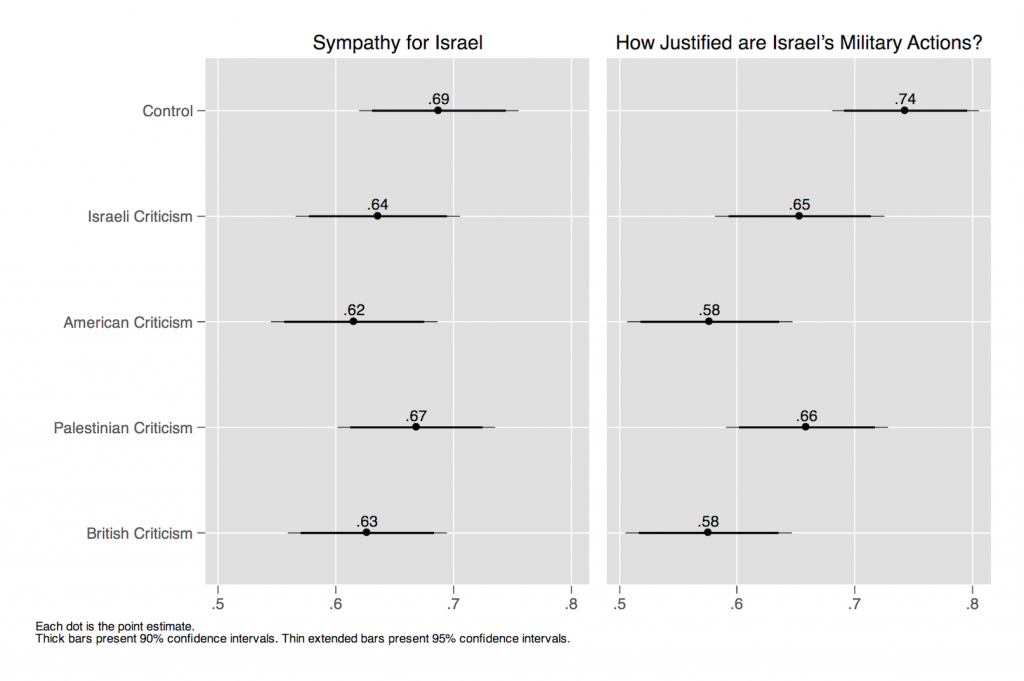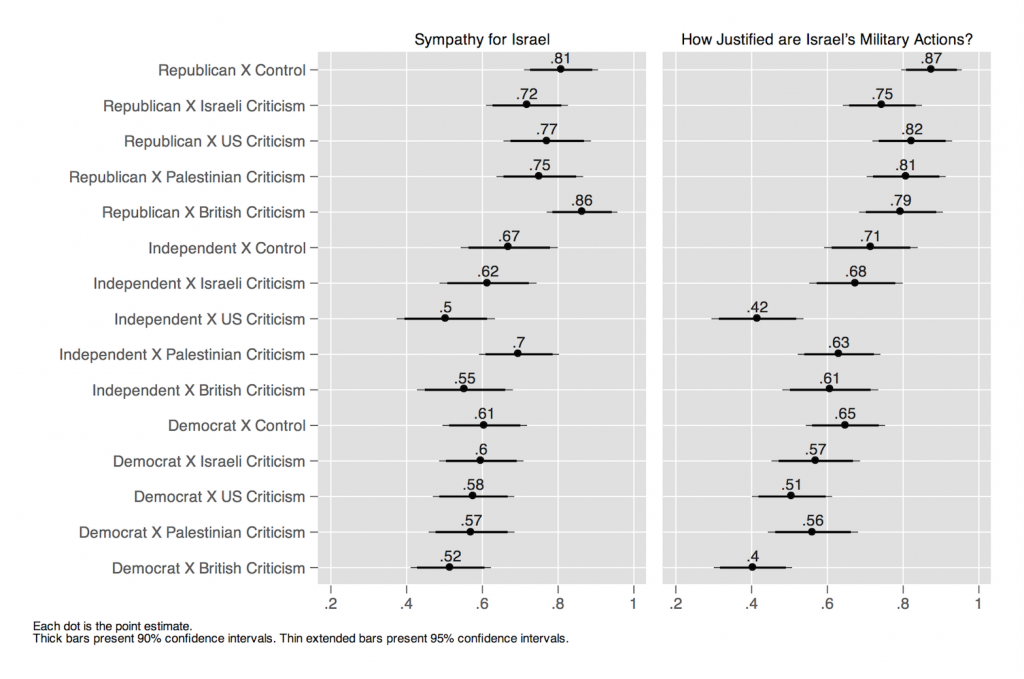
 Matthew Leep and Jeremy Pressman find that foreign criticism of Israel is modestly consequential, but is generally on par with domestic (American) criticism. They also suggest that Americans might be willing to discount foreign criticism in the face of bipartisan domestic support for Israel.
Matthew Leep and Jeremy Pressman find that foreign criticism of Israel is modestly consequential, but is generally on par with domestic (American) criticism. They also suggest that Americans might be willing to discount foreign criticism in the face of bipartisan domestic support for Israel.
Foreign sources potentially provide important information and perspectives on international affairs for domestic audiences. While there is limited research on the topic, some studies suggest that foreign sources exert strong effects on Americans’ foreign policy views. In our recent study, we set out to understand how foreign voices, including British, Israeli, and Palestinian sources, affect U.S. opinion on a politically divisive and globally important issue—the Israeli-Palestinian conflict. We also explored how American views on this conflict emerge in a competitive context of bipartisan U.S. support for Israel alongside foreign criticism of Israel.
To examine these issues, we used original survey experiments in which respondents read two news stories – one criticising Israel’s military actions and the other criticizing Israeli settlements – and then answered several questions measuring their support for Israel.
Overall, our findings raise scepticism about the greater influence of foreign voices. While our results reveal that foreign criticism of Israel is modestly consequential, it is generally on par with domestic (American) criticism. Interestingly, for some survey questions we found evidence indicating that effects might vary depending on party identification. For example, British sources had strong effects on Democrats’ but not Republicans’ opinions about whether Israel’s military actions are justified. In addition, our results suggest that Americans might be willing to discount foreign criticism of Israel in the face of bipartisan US Congressional support for Israel.
Survey Experiments and Results
In our first experiment, respondents read a story about clashes between soldiers of the Israel Defense Forces (IDF) and Palestinians. The story also described the larger context of the conflict in terms of casualties and the broad causal claims each side makes about the impact of Palestinian incitement and Israeli occupation. The experimental conditions each added a paragraph with an Israeli, Palestinian, or British human rights organisation criticising the conduct of the Israeli military. The language of the criticism was exactly the same but the organisational source of this criticism changed across the conditions. Respondents were randomly assigned to the control or one of the experimental conditions.
The results show that the effects of foreign sources were sensitive to the type of outcome measure. Both foreign (Israeli or British) and domestic (American) criticism had a negative, albeit modest, impact on sympathy for Israel and moderately negative impact on support for Israel’s actions towards the Palestinians. In contrast, such criticism did not change opinion on questions about the effectiveness of Israel’s military actions or the U.S. role in mediating the conflict. Figure 1 shows the probability of agreeing with the statement ‘In the dispute between Israel and the Palestinians, I sympathize more with Israel’ and agreeing that ‘Israel’s military actions against the Palestinians’ are justified. While any change we found in terms of sympathy for Israel is minimal, we see strong effects regarding support for Israel’s military actions against the Palestinians. The predicted probability of believing that Israel’s military actions are justified for individuals in the control group is .74 but only .58 in both the British and American conditions. Individuals exposed to human rights criticism of Israel therefore seem less likely to believe that IDF actions against the Palestinians are justified, but whether the source is foreign or domestic has little bearing.
Figure 1 – Probability of sympathy for Israel and support for Israel’s military actions
 We also examined whether the effects of the sources were potentially different for partisans. Figure 2 shows a notable drop in support for Israel in response to Israeli criticism among Republicans. Interestingly, British criticism had almost no effect on Republicans but strongly swayed Democrats (.65 predicted probability of believing Israel’s actions are justified in the control condition and .40 in the British condition). Thus, in the case of human rights criticism of Israel, Democrats seem to be highly persuaded by a British organisation in this particular scenario. These results are a noteworthy addition to prior research suggesting Democrats are more influenced by foreign cues than Republicans. Also, with more opinion change regarding IDF actions than sympathy for Israel, we can only speculate that sympathy for Israel might not be as malleable as opinions on IDF actions against Palestinians. In other words, general sympathy for Israel can co-exist with opposition to specific IDF actions.
We also examined whether the effects of the sources were potentially different for partisans. Figure 2 shows a notable drop in support for Israel in response to Israeli criticism among Republicans. Interestingly, British criticism had almost no effect on Republicans but strongly swayed Democrats (.65 predicted probability of believing Israel’s actions are justified in the control condition and .40 in the British condition). Thus, in the case of human rights criticism of Israel, Democrats seem to be highly persuaded by a British organisation in this particular scenario. These results are a noteworthy addition to prior research suggesting Democrats are more influenced by foreign cues than Republicans. Also, with more opinion change regarding IDF actions than sympathy for Israel, we can only speculate that sympathy for Israel might not be as malleable as opinions on IDF actions against Palestinians. In other words, general sympathy for Israel can co-exist with opposition to specific IDF actions.
Figure 2 – Probability of sympathy for Israel and support for Israel’s military actions and partisan interactions
We also conducted a second experiment exploring the influence of criticism from Israeli and British politicians in the context of Israeli settlements and tested whether the effects of source cues are potentially neutralised by bipartisan US Congressional support for Israel. Each respondent read a story about Israeli government approval of new housing in a settlement in the West Bank. The story included divergent claims from both sides and brief historical information about settlements.
The first two experimental conditions each added a paragraph with either an Israeli member of the Israeli parliament or the Speaker of the House of Commons calling the construction ‘a major obstacle to peace’ and stating that the new settlements would ‘undermine the territorial compromises that will be necessary in final status talks’. In the second two treatment conditions, this criticism was immediately followed by a paragraph about U.S. congressional Republicans and Democrats supporting Israel.
Figure 3 – Probability of sympathy for Israel and support for Israeli settlements
Figure 3 shows a modest decrease in both sympathy for Israel and support for settlements among respondents exposed to criticism of Israel, and a neutralising effect on participants exposed to simultaneous foreign criticism and Congressional domestic support for Israel. We see similar results for support for Israel’s settlements. These findings suggest that foreign source cues can modestly weaken support for Israel settlements, but awareness of domestic bipartisan consensus can somewhat neutralise the effects of these critical cues.
Conclusions
US policy toward the Israeli-Palestinian conflict is consequential, and the inclusion of British, Israeli, and Palestinian voices about the conflict can potentially enrich the American public’s understanding of the conflict. We find, however, that foreign sources have mostly modest effects, and overall are on par with domestic sources. Furthermore, bipartisan domestic agreement appears to diminish any effect of foreign voices expressing differing and critical views.
- This blog post first appeared at LSE British Politics and Policy and draws on the authors’ published work in The British Journal of Politics and International Relations.
- Featured image credit: Pixabay (Public Domain).
Please read our comments policy before commenting
Note: This article gives the views of the author, and not the position of USAPP– American Politics and Policy, nor of the London School of Economics.
Shortened URL for this post: http://bit.ly/2SZIlw9
 Matthew Leep – Western Governors University
Matthew Leep – Western Governors University
Matthew Leep is an instructor of political science at Western Governors University. He is on twitter @matthewcoenleep.
 Jeremy Pressman – University of Connecticut
Jeremy Pressman – University of Connecticut
Jeremy Pressman is an associate professor of political science and director of Middle East Studies at the University of Connecticut. He is co-director of the Crowd Counting Consortium at crowdcounting.org. Pressman is on twitter @djpressman.






There is no connection between the “British” and the “Americans” regarding the Israeli-Palestinian conflict; any research making a connection is flawed. The true connection between the Israeli-Palestinian conflict lies more with people who identify as “Christians” and those who identify with ”Marxist” policies (i.e., Socialists).
Basically, Christians generally make the spiritual connection to Israel because Jesus Christ was/is Jewish, thus Christians generally are pro-Israel. Moreover, being that the Ottomans and the Moors made credible attempts to conquer Europe and to destroy Western culture AND being that we currently experience acts of terrorism in our own homelands, those who identify as Western Christians have developed an anti-Palestinian sentiment. Alternatively, those who identify as Marxist and/or support Marxist policy (i.e., Socialists) have generally been inspired by Karl Marx’s anti-semitism and hatred of Western culture and capitalism; hence, these people generally support the Palestinians.
Today, both the UK and the US have been infiltrated by Marxists in media, academia, and government, thus we still have this internal conflict regarding the Israeli-Palestinian conflict.